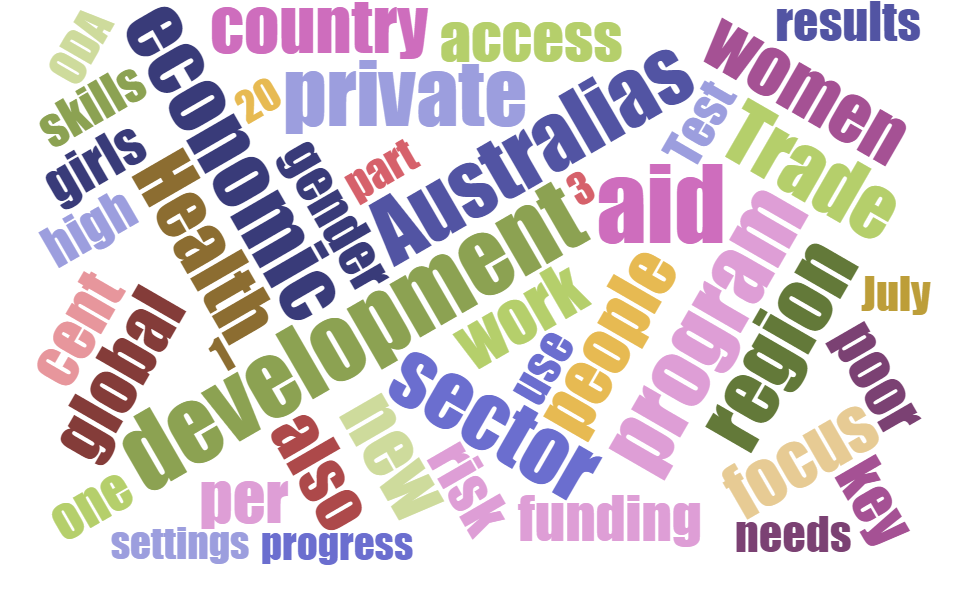Development doesn’t have a way with words. It scrunches names into acronyms. It potholes sentences with jargon. Its grey literature is drearier than grey. Words get their revenge too. They confuse, they strive for prominence, they rig the game. Or they hide shyly, letting themselves be avoided when they should be used more often.
Words shape our thinking — and here are two words the dialects of aid work and development thought would be better off without, as well as two words we ought to use more often.
Neoliberalism:
While it would be bad for the word count of some journals, ditching the term ‘neoliberalism’ would be great for critical thinking about development. I say this not because I think free markets are miraculous or because I think trying to solve economic crises with pro-cyclical policies is a good idea. My issue with the word neoliberalism is that among parts of the left it has become nothing more than a synonym for ‘stuff we don’t like’. This leads to all sorts of confusion: to post-development thinkers the problem with neoliberalism appears to be that it promotes economic development; while to left-leaning economists [free registration required] one of the problems is that it impedes it.
Even when the term is used intelligently it is still too crude, at odds with the complex history of the last four decades of development. These have been decades in which some countries used industrial policy to great advantage, while others just wasted money; decades in which government spending has brought some countries human development gains, while other governments have lost similarly intended spending to corruption; and decades in which globalisation has reduced poverty in countries such as China, but done less to help in some other parts of the world.
Amongst all this there are plenty of debates to be had about the role of the state, the role for aid, and even what the ultimate end goals of development should be, but given the complexities involved, single catch-all epithets like neoliberalism are worthless.
Innovation:
Whereas neoliberalism is a well-worn battering ram afflicting general debates about development, innovation is a term that has, in the last year or so, burst into a particular part of development: the aid scene (and especially the Canberra aid scene).
My problem with innovation isn’t that I’m against trying to find new ideas to solve old problems. Rather, I find the word objectionable in part because it is unobjectionable: it’s loaded, so full of positive connotations that it affords an advantage to almost any claim made in its name. It’s also misleading, because it suggests that many of the problems that continue to plague aid work do so simply because no one has had any bright ideas for solving them. But problem solving has been around as long as aid work has.
There’s also an issue in the way that innovation is associated with an idealised take on the private sector — a private sector that innovates to provide us with smart phones and tablets, and so on. The private sector innovates, therefore we should too! The trouble with thinking like this is not that the private sector is bad, but rather that when the private sector innovates successfully, it does so as a consequence of a combination of consumer choice, the invisible hand of the market, and something akin to creative destruction — forces which winnow out bad ideas and promote better ones. Even this is a flawed system, which requires the state to provide rules and watchdogs, alongside occasional bailouts and research subsidies, but it is a system with something akin to feedback loops. The world of aid is characterised, on the other hand, by impacts felt in far flung places, politics and political risk aversion, poor data, and a reluctance to talk about failure. It is, in other words, a very different system. And there’s no reason to think innovation à la the private sector will work wonders within it.
Learning:
This isn’t to say we should give up on improving aid work. However, there’s a much better — if more modest — word for the best means of doing this: learning. Particularly, institutionalised learning, which in aid work involves good monitoring and evaluation within aid programmes, and staff who have the time to absorb and adapt. Mercifully, I’m not the first person to have the idea that aid learning is important: some NGOs, donors and multilaterals do it well and, like problem solving, learning is as old as aid itself. But learning takes money and staff, and wants for glamour (particularly political glamour), and much of the aid world still doesn’t learn as well as it should.
For different reasons, beyond aid, in the realms of development debate more generally, learning is slow and sluggish too. Here the issue is sometimes simply that good development research is not easy. But sometimes the problem is also that for many people (including academics) polemic is more satisfying than caveats, qualification and complexity.
Context:
The other word I wish we used more often is also modest: context. Because different types of aid have led to different outcomes in different countries, and because different developing countries face different challenges, context ought to be one of the most prominent words in the lexicon of aid and development.
The good news is that context isn’t completely ignored: academics study countries, and aid programs learn about country contexts, even if often through the informal learning of staff at post. But the idea that context matters, that it is worthy of much more study, and that it should be a central force shaping aid work, has not had a heyday yet. Which is a pity — affording prominence to context would be, well, innovative, and we would learn.
Terence Wood is a Research Fellow at the Development Policy Centre. His PhD focused on Solomon Islands electoral politics. Previously he worked for the New Zealand Government Aid Programme.





Good post Terence!
I agree with your critique of the term neoliberalism. I find that the term is used in a similar way in development the way New Public Management (NPM) is thrown about in discussions of public administration in the North. It is has become too wide a term that is used to describe a plethora of interventions or reforms that are often not directly connected, except temporally. Subsequently, they are dismissed in a ritualistic fashion. Much better to be precise about what exactly you are critiquing and what can be improved.
When it comes to innovation, it is another buzzword, and the precise content of varies according to the context. It may be used in an inclusive fashion as a way to build capacity and time for creative problem solving and using new methods and approaches within development organisations. Usually, if it is the fundraising and institutional partnerships arm of an organization that is promoting the term innovation, it becomes heavily tilted towards the private sector and often technological silver bullet solutions, often as a part of a larger branding strategy externally to find more private sector partners.
However, there is an innovation “movement” within public administration. Within the public sector innovation movement, connected with the proliferation of government innovation labs, it is often said that the word innovation should not be used as much in internal communications. Innovations teams promote specific methodologies and approaches such as user-centered design and/or behavioural approaches and should promote those specific approaches rather than an unspecific innovation agenda.
In the National Health Service in England, promotion of new approaches and new service delivery models are communicated as quality improvement, because the term innovation within healthcare is almost exclusively applied to the development of new drugs and medical devices.
The innovation agenda in development is about taking more calculated risks, experimenting with new approaches and investing in the organizational capability to adapt and evolve. Learning is a key component of this but it cannot be reduced to it.
Yes, more quality improvement, more experimentation and if need be, use the word innovation to promote it externally.
Thanks Kjetil for a very good comment.
I agree, if the word innovation helps sell externally internal processes such as “more quality improvement, more experimentation” (and I would add more learning) then, so long as we don’t end up captured by the term that’s fine.
Unfortunately in aid work (at least in this neck of the woods) I don’t think innovation is being used as a means of selling better practice.
However, like you, I am all for creating learning organisations.
Thanks again.
Terence
Hi Terence, and thanks for your provocative post…
I like your challenge to the lexicon of development, which can become incredibly entangled within its own world of jargon. I was going to comment on ‘innovation’ and compare it with ‘sustainability’ as a word with many meanings. And suggest despite that – or perhaps because of it – it had a role to play as a conversation starter, which could lead into many areas of development, including problem identification, focus in designs, drawing out the things that are working well in implementation, and engaging new entities to help scale-up the successes.
But then I realised another aspect of your post is perhaps more interesting to explore. Your “world of aid” seems distinct from the private sector? Don’t these ‘far flung places’ have people working in the private sector, be it farmers selling into markets or local companies working for the donors? Are they not looking at ways to innovate to get an edge in the market place, or even access to donors? Also under learning – there is much aid-related learning activity within the local and international private sector that falls under this banner, including a range of interesting engagements between sectors on aid-related issues.
Perhaps I’m suggesting a way to bridge your distrust of innovation and your words of choice. The concept of starting with a blank sheet of paper for an “ideation” (!) session may be a useful tool for creative thinking, but any innovation before it ‘goes to market’ (development speak – gets piloted / implemented), definitely needs rigorous testing against knowledge drawn from existing and historic programs, as well as ensuring its relevance to the development context. How then to extract and package the relevant learnings and knowledge about context around emerging innovations to improve their traction, and reduce risks associated with failure?
Not an easy task, but neither’s expungement… goodluck!
Thanks Angus,
I think I follow you. I take your point to be that we (the world of aid) may do our best learning if we seek to emulate my stylised model of innovation in the private sector by starting with a blank sheet for bright ideas but then subjecting ideas to “competition” in the world of ideas through “rigorous testing against knowledge drawn from existing and historic programs”. Innovation in this sense seems fine to me — now that it’s shorn of its gee-whiz factor.
This seems fine to me. Though I think your question “How then to extract and package the relevant learnings and knowledge about context around emerging innovations to improve their traction, and reduce risks associated with failure?” is the crucial one. Part of my response is that we will do a better job if we simply, explicitly admit that we need to study and to learn. The second part is that we need to devote a higher share of our aid spend to resources for learning. i.e. M&E and research, and to having sufficient aid staff in aid agencies that they can take the time to learn.
Thanks again.
Terence
Thanks for an interesting post Terence.
I agree with much of what you say, although I do think this should be read as a call for careful and intelligent application of terminology rather than the using words less.
This is particularly true with ‘context’. In any aid related documents I read, context is written everywhere. It is overused, but under-analysed. So perhaps we could usefully think critically about context rather than encourage further repetition!
For example, we could usefully ask these questions:
Whose context are we describing? Whose views have we taken into account in doing so? What are the differences between those views? Whose have we prioritised in our analysis? Why? How have perceptions of history shaped how context is understood by different actors today? What world views do we bring to the table with our analysis? How are we part of the context?
I could go on…context is often viewed in a static and one-dimensional (‘our’) way. It’s too often a get out clause (our programme/analysis is ‘context-specific’). My view is that is what needs to be challenged…
Thanks Craig,
I basically agree: if context becomes just another buzzword it won’t change anything. Rather I’m calling for aid work to eschew trends on concentrate on the things that really matter like context.
I’m less sure about the meta-physical stuff (whose, what, whose, how?). I appreciate that these things may bias our analysis. But good contextual learning (aka research) ought to be structured to minimise these biases as best possible. We don’t do this perfectly. But we can do it well enough for our learning to be very useful.
Thanks again
Terence
Thanks Robert!
Terence,
There is another reason not to like neo-liberalism and that is (it is so 1990s!!!) the world has moved on quite a bit. The push back by the development state against neo-liberal ideas particularly since the Asian economic crisis is palpable. The State is back and if we need a label we could call it neo-corporatism where the state is exercising much more control over all aspects of society including the corporates, civil society and the like. The state in being interpenetrated by business and (dare I say) religion in particular; so the neoliberal free market is now much more constrained.
Excellent post, Terence. Thank you. I like the direction you take and wish that more people who write about aid would be careful with the language they use. Some terms, as you suggest with neoliberalism, become nothing more than empty slogans. I am particularly pleased you list learning and context. So much of aid is surely concerned with learning and yet, as you point out, so little is learned from the extensive monitoring and evaluation that is carried out, primarily in my experience, for accountability purposes only. Donors, particularly, seem to pay insufficient attention to learning from past experience and putting that learning into policies and practice. Finally, your listing of context is important too. Far too much writing about aid is at a level of generalisation that dos not recognise the peculiarities of development challenges in the vastly different contexts of, say, health in PNG or law and justice in Indonesia. Very different worlds!